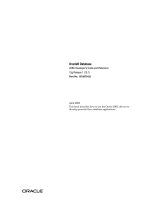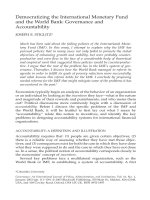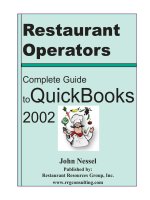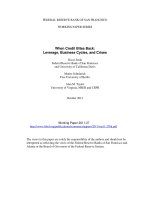I FRS Practical Implementation Guide and Workbook pptx
Bạn đang xem bản rút gọn của tài liệu. Xem và tải ngay bản đầy đủ của tài liệu tại đây (2.27 MB, 492 trang )
JOHN WILEY & SONS, INC.
Wiley
Abbas Ali Mirza Magnus Orrell Graham J. Holt
Second Edition
Practical Implementation
Guide and Workbook
I F RS
Wiley
Second Edition
Practical Implementation
Guide and Workbook
I F RS
JOHN WILEY & SONS, INC.
Wiley
Abbas Ali Mirza Magnus Orrell Graham J. Holt
Second Edition
Practical Implementation
Guide and Workbook
I F RS
Portions of this book have their origins in copyrighted materials from the International Accounting Standards
Board. These are noted by reference to the specific pronouncements, except for certain of the definitions
introduced in bold type, which appear in a separate section at the beginning of each chapter. Complete
copies of the international standards are available from the IASB. Copyright © International Accounting
Standards Board, 30 Cannon Street, London EC4M 6XH, United Kingdom.
This book is printed on acid-free paper.
∞
Copyright © 2008 by John Wiley & Sons, Inc. All rights reserved.
Published by John Wiley & Sons, Inc., Hoboken, New Jersey
Published simultaneously in Canada.
No part of this publication may be reproduced, stored in a retrieval system, or transmitted in any form or by
any means, electronic, mechanical, photocopying, recording, scanning, or otherwise, except as permitted
under Section 107 or 108 of the 1976 United States Copyright Act, without either the prior written
permission of the Publisher, or authorization through payment of the appropriate per-copy fee to the
Copyright Clearance Center, 222 Rosewood Drive, Danvers, MA 01923, (978)750-8400, fax (978)750-4470,
or on the Web at www.copyright.com. Requests to the Publisher for permission should be addressed to the
Permissions Department, John Wiley & Sons, Inc., 111 River Street, Hoboken, NJ 07030, (201)748-6011,
fax (201)748-6008, or online at
Limit of Liability/Disclaimer of Warranty: While the publisher and author have used their best efforts in
preparing this book, they make no representations or warranties with respect to the accuracy or completeness
of the contents of this book and specifically disclaim any implied warranties of merchantability or fitness for
a particular purpose. No warranty may be created or extended by sales representatives or written sales
materials. The advice and strategies contained herein may not be suitable for your situation. You should
consult with a professional where appropriate. Neither the publisher nor author shall be liable for any loss of
profit or any other commercial damages, including but not limited to special, incidental, consequential, or
other damages.
For general information on our other products and services, please contact our Customer Care Department
within the US at 800-762-2974, outside the US at 317-572-3993 or fax 317-572-4002.
Wiley also publishes its books in a variety of electronic formats. Some content that appears in print may not
be available in electronic books. For more information about Wiley products, visit our Web site at
www.wiley.com.
ISBN: 978-0470-17022-9
Printed in the United States of America
10 9 8 7 6 5 4 3 2 1
CONTENTS
Chapter Title Page No.
1 Introduction to International Financial Reporting Standards 1
2 IASB Framework 8
3 Presentation of Financial Statements (IAS 1) 13
4 Inventories (IAS 2) 27
5 Cash Flow Statements (IAS 7) 35
6 Accounting Policies, Changes in Accounting Estimates and Errors (IAS 8) 51
7 Events After the Balance Sheet Date (IAS 10) 61
8 Construction Contracts (IAS 11) 67
9 Income Taxes (IAS 12) 77
10 Segment Reporting (IAS 14) 94
Appendix: Operating Segments (IFRS 8) 103
11 Property, Plant, and Equipment (IAS 16) 108
12 Leases (IAS 17) 117
13 Revenue (IAS 18) 129
14 Employee Benefits (IAS 19) 137
15 Accounting for Government Grants and Disclosure of Government
Assistance (IAS 20) 151
16 The Effects of Changes in Foreign Exchange Rates (IAS 21) 159
17 Borrowing Costs (IAS 23) 170
18 Related-Party Disclosures (IAS 24) 176
19 Accounting and Reporting by Retirement Benefit Plans (IAS 26) 186
20 Consolidated and Separate Financial Statements ( IAS 27) 193
21 Investments in Associates (IAS 28) 202
22 Financial Reporting in Hyperinflationary Economies (IAS 29) 210
23 Interests in Joint Ventures (IAS 31) 215
24 Financial Instruments: Presentation (IAS 32) 221
25 Financial Instruments: Recognition and Measurement (IAS 39) 236
26 Earnings Per Share (IAS 33) 286
27 Interim Financial Reporting (IAS 34) 299
28 Impairment of Assets (IAS 36) 304
29 Provisions, Contingent Liabilities, and Contingent Assets (IAS 37) 317
30 Intangible Assets (IAS 38) 330
31 Investment Property (IAS 40) 345
32 Agriculture (IAS 41) 353
33 First-Time Adoption of International Financial Reporting Standards (IFRS 1) 362
34 Share-Based Payments (IFRS 2) 382
35 Business Combinations (IFRS 3) 402
36 Insurance Contracts (IFRS 4) 421
37 Noncurrent Assets Held for Sale and Discontinued Operations (IFRS 5) 428
38 Exploration for and Evaluation of Mineral Resources (IFRS 6) 440
39 Financial Instruments: Disclosures (IFRS 7) 448
Index 461
FOREWORD
TO THE FIRST EDITION
by the Chairman of IASB
I and my fellow Board members at the International Accounting Standards Board (IASB) are committed
to developing high quality, understandable, and enforceable global accounting standards that meet the de-
mands for comparable and transparent information in the world’s capital markets. Recently we completed a
work program to develop and issue a stable platform of such standards. Those standards, the International
Financial Reporting Standards (IFRS), are now being implemented in a large number of countries around the
world. This is a major achievement on the road towards the global acceptance of a single set of accounting
standards.
The responsibility for achieving high quality financial reporting, however, does not rest solely with
IASB. Our role is limited to providing the set of standards that entities should apply to achieve high quality,
comparable, and transparent financial reporting. For IFRS to be properly understood, implemented, and ap-
plied in practice, education and training of all relevant parties—including financial statement preparers,
auditors, regulators, financial analysts, and other users of financial statements as well as accounting
students—is essential.
This book should be a helpful tool in this regard. The approach of the book is to discuss core concepts
and other key elements of the standards and to provide training material in the form of worked case studies
and questions to support successful learning of the material. Consequently, the book should be useful for
students who prepare for professional exams and for financial statement preparers, auditors, regulators, fi-
nancial analysts, and other users of financial statements who in their work need to be familiar with the stan-
dards. The book should help practitioners and students alike understand, implement, and apply the key ele-
ments of the standards.
Sir David Tweedie
Chairman of IASB
December 2005
FOREWORD
TO THE FIRST EDITION
by the Secretary General of IOSCO
In recent years much has been written about International Financial Reporting Standards (IFRS) so it is
opportune that a publication such as this would be released at this time particularly since this initiative helps
to bring such clarity and focus to the debate.
Globalization is taking place at an ever more rapid pace. As cross-border financial activity increases,
capital markets become more dependent on each other. As financial markets become ever more interdepend-
ent, there is a greater need for the development of internationally recognized and accepted standards dealing
with capital market regulation.
The development of IFRS can be seen within this broader framework. They represent an especially use-
ful instrument designed to promote a stable and more secure international regulatory environment. At the
same time, IFRS deliver on accounting and disclosure objectives as well as the pursuit of improved transpar-
ency of global financial reporting.
For the International Organization of Securities Commissions (IOSCO), the development and subsequent
progress of IFRS represents a priority outcome. The organization has been a key stakeholder with an active
involvement in the process of setting the standards and in continually assessing their quality.
This involvement reflects a long history of commitment by IOSCO to efforts aimed at strengthening the
integrity of international markets through the promotion of high quality accounting standards, including rig-
orous application and enforcement.
At the same time, there is an obligation of international standard setters to be responsive to concerns
over the application and interpretation of the standards. This is a key complement to the success of IFRS and
one which we take seriously.
Ultimately, accounting standards setting is a continuous process that must respond to changes and devel-
opments in the markets and the information needs of investors. Indeed, it has always been the case that ef-
fective financial reporting is fundamental to investor confidence as well as good corporate governance.
In the long term, the adoption of IFRS in many countries and their use in numerous cross-border trans-
actions will help to bring about these high quality global accounting standards by providing transparent and
comparable information in financial reports.
Although as an international standards setter IOSCO is not in position to endorse external publications,
we have always recognized that by helping to promote clear information about the IFRS, publications such as
this one serve a particularly useful function both as an educational opportunity and also to encourage confi-
dence in these standards. On that basis it is most welcome.
Philippe Richard
IOSCO Secretary General
March 2006
PREFACE
This is indeed an exciting time to prepare an updated and expanded edition of this book. Since the
issuance of the first edition, International Financial Reporting Standards (IFRS) have continued to extend its
reach as the recognized set of accounting standards in an increasing number of jurisdictions around the globe.
This trend is set to continue. More countries have announced their intention to adopt IFRS in the next few
years. Furthermore, the November 15, 2007 announcement by the US Securities and Exchange Commission
(SEC) to allow foreign private issuers to enter the US capital market using IFRS-compliant financial
statements (without reconciling to US GAAP) came as a surprise to many in international financial circles
and was considered a historic move on the part of the US SEC; this favorable nod by the US SEC to the
IASB standards may undoubtedly result in even greater momentum for further acceptance of IFRS globally.
With such extraordinary achievements to its credit the IASB feels confident that more and more global
players will sooner or later convert to IFRS. In fact, major economic players such as Canada and India have
already announced their plans to go the “IFRS route” by 2011. Commenting on how many more countries
are expected to adopt IFRS by 2011, Sir David Tweedie, chairman of the IASB, remarked, “we reckon by
about 2011 there’ll be 150—all the major economies” (Accountancy, January 2008).
Compared with the first edition, we have expanded the book by including extracts from published
financial statements illustrating the application of IFRS. This will help readers better understand how the
principles may be applied in practice. Additionally, we have updated the book to incorporate brief
explanations of new and revised pronouncements, in particular IFRS 8, Operating Segments, and the revised
IFRS 2, IFRS 3, IAS 1, IAS 23, IAS 27, and IAS 32 as well as IFRICs 10 to 14.
We received a good deal of positive feedback and praise from readers of the first edition. With the
changes to this second edition, we hope that readers will find this edition even more useful in navigating the
complex and changing landscape of IFRS. We continue to invite suggestions and comments for future
editions. As with the first edition, any views expressed in this publication are ours alone and do not
necessarily represent those of the firms or organizations of which we are part.
Abbas Ali Mirza
Magnus Orrell
Graham Holt
February 2008
ACKNOWLEDGMENTS
This book would not have seen the light of the day without the help of so many wonderful people around
the globe who have helped us to put it together. This IFRS workbook project was conceived and
conceptualized way back in 1998, but due to certain unanticipated issues that surfaced later, the project was
dropped, only to be revived in 2005. We would be remiss in our duties if we did not thank the editors at John
Wiley & Sons, Inc., USA, who had implicit faith in our abilities and greatly helped us in giving shape to this
creative endeavor. In particular, we wish to place on record our sincere appreciation of the help provided to
us by the following individuals of John Wiley & Sons: Robert Chiarelli, for his patronage of this book
project; John De Remigis, for his stewardship of this book project from its incubation stages in 1998 to its
completion in 2006 and for his perseverance for these many years; Judy Howarth and Brandon Dust, for their
able guidance and patience; Natasha Andrews-Noel and Pam Reh and their editorial staff, for their creative
and valuable editorial comments and assistance; and the staff of the marketing department for their
outstanding marketing plans and ideas.
We also wish to place on record our sincere appreciation of the untiring efforts of Ms. Liesel Knorr, the
current president of the German Accounting Standards Board and formerly technical director of the
International Accounting Standards Committee (IASC), the predecessor body to the IASB, for her thorough
technical review of the entire manuscript. Her invaluable comments have all been taken into account in
writing this book.
We are also grateful to all our friends and colleagues who helped us during the preparation of this book.
Abbas Ali Mirza wishes to place on record his sincere gratitude for all the constructive suggestions
offered to him by his friends in conceptualizing the idea of such a workbook on IFRS during its formative
stages. Furthermore, for their unstinting support, creative ideas, and invaluable contributions, he also wishes
to thank his peers and mentors, in particular: Omar Fahoum, chairman and managing partner, Deloitte &
Touche (M.E.); Graham Martins, partner, Pannell Kerr Forster, United Arab Emirates; Dr. Barry J. Epstein,
partner, Russell Novak & Co., LLP, USA, his longtime coauthor of the other IFRS book published by John
Wiley & Sons, Inc., (Wiley: IFRS); and all his partners and colleagues from Deloitte & Touche (M.E.),
including but not limited to Joe El Fadl, Graham Lucas, Anis Sadek, Musa Dajani, Ghassan Jaber, Indika
Wijayarathne, Vikas Takhtani, Hala Khalid, Shivani Agarwal, Nisreen Ghulam and Umme Kulsoom Soni.
Magnus Orrell extends his special thanks to his wife, Kristin Orrell, as well as to Andrew Spooner of
Deloitte & Touche LLP in the United Kingdom and Bengt-Allan Mettinger, accounting consultant in
Thailand, who all read earlier versions of the material in this book relating to financial instruments and
provided many valuable comments and suggestions.
Graham Holt wishes to thank all the special people who have directly and indirectly helped him in
preparing this book. (They know he is grateful.)
ABOUT THE AUTHORS
Abbas Ali Mirza is a partner at Deloitte & Touche (M.E.) based in Dubai and handles audits of major
international and local clients of the firm. At Deloitte he is also responsible for regional functions, such as
technical consultation on complex accounting and auditing issues. Abbas heads the Learning function for
Deloitte, Middle East, and is a member of the Global firm’s EMEA Learning Executive. He has had a
distinguished career in accounting, auditing, taxation, and business consulting and has worked for
international audit and consulting firms in the United States of America, the Middle East, and India. Abbas is
a frequent principal/keynote speaker at major global conferences on International Financial Reporting
Standards (IFRS) and has chaired world-class events on accounting, such as the World Accounting Summit
held in Dubai under the auspices of the United Nations Conference on Trade and Development (UNCTAD).
He has coauthored another book on IFRS published by John Wiley & Sons, Inc., Wiley: IFRS. He holds or
has held many positions of repute in the accounting profession globally including
• 21st Session Chairman, United Nations’ Intergovernmental Working Group of Experts on
International Standards on Accounting & Reporting (ISAR), to which position he was elected at the
UNCTAD in Geneva in November 2004
• Member of the Developing Nations Permanent Task of the International Federation of Accountants
(IFAC), recently renamed IFAC’s Developing Nations Committee
• Member of the Accounting Standards Committee, Securities and Exchange Board of India (SEBI),
India
• Chairman of Auditors’ Group, Dubai Chamber of Commerce and Industry (DCCI)
• Technical Adviser to the Gulf Co-operation Council Accounting and Auditing Organization
(GCCAAO)
• Member of the Consultative Group of Experts on Corporate Governance Disclosures, United Nations
Conference on Trade & Development (UNCTAD)
• Member of the Consultative Group of Experts on Corporate Social Responsibility, United Nations
Conference on Trade & Development (UNCTAD)
Magnus Orrell is a partner at Deloitte & Touche LLP in Wilton, Connecticut (USA). His focus is on
financial instrument accounting issues under both IFRS and United States generally accepted accounting
principles (GAAP). Prior to joining Deloitte in 2003, he served in various international standard-setting and
regulatory roles. For three years, he was a project manager at the International Accounting Standards Board
(IASB) in London, the United Kingdom, playing a key role in IASB’s work to develop and improve the
international accounting standards for financial instruments. The prior three years, he served as a member of
the Secretariat of the Basel Committee on Banking Supervision at the Bank for International Settlements
(BIS) in Basel, Switzerland, working with senior central bank and banking regulatory officials from around
the world in formulating regulatory views and policies on financial reporting and disclosure issues. Earlier
on in his career, he was an official of the European Commission in Brussels, Belgium, and an accounting
specialist at the Financial Supervisory Authority (Finansinspektionen) in Stockholm, Sweden, respectively.
Apart from being a Certified Public Accountant (CPA) in the State of Connecticut, he also holds the
Chartered Financial Analyst (CFA) designation conferred by the CFA Institute (formerly the Association for
Investment Management and Research), the Certified Internal Auditor (CIA) designation conferred by the
Institute of Internal Auditors (IIA), and the Certified Financial Risk Manager (FRM) designation conferred
by the Global Association of Risk Professionals (GARP). Additionally, the IIA has awarded him its William
S. Smith Certificate of Excellence for outstanding performance on the CIA exam. He also holds a number of
academic degrees, including a Degree and Master of Science in business administration and economics
(Sweden), a Degree of Master of Laws (Sweden), and a Master of Accounting and Financial Management
(United States). He has been a frequent speaker at seminars, conferences, and executive-level meetings in
many countries in the Americas, Europe, and Asia, and has authored articles in both accountancy and finance
periodicals.
Graham Holt qualified as a Chartered Accountant (Institute of Chartered Accountants in England &
Wales) with Price Waterhouse and is a fellow of the Association of Chartered Certified Accountants
(ACCA). He holds B.Com and MA Econ qualifications also. As a current ACCA examiner, he has been
prominent in the development of their IFRS stream and their examination scheme. He is a principal lecturer
at the Manchester Metropolitan University Business School, where he is director of Professional Courses.
Graham has given lectures on IFRS throughout the world and has many publications in the subject area. He
has also been involved in running training courses on IFRS.









